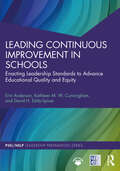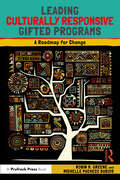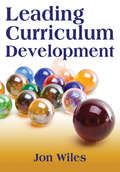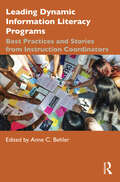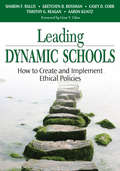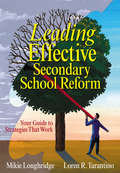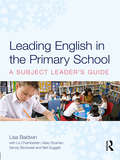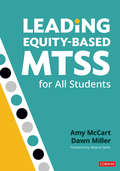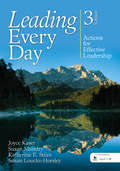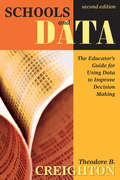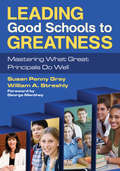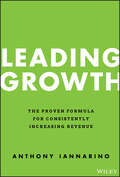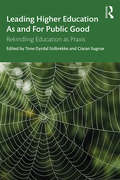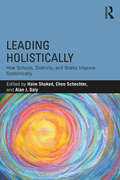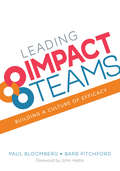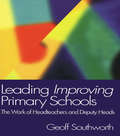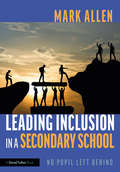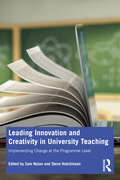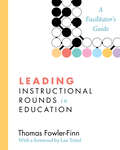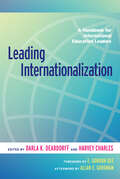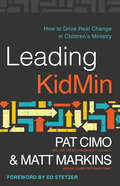- Table View
- List View
Leading Continuous Improvement in Schools: Enacting Leadership Standards to Advance Educational Quality and Equity (PSEL/NELP Leadership Preparation)
by Erin Anderson Kathleen M. Cunningham David H. Eddy-Spicer• Aligns improvement efforts with two sets of standards, NELP and PSEL – no other books in the field do this. • To help ground the main points in this volume, each chapter features a case that presents a leader who is simultaneously leading a school while also learning about improvement science in their graduate class. • To help instructors use this book in their courses, each chapter includes teaching notes and an action inventory aligned to the case examples and chapters. • Uses Improvement Science as a method of continuous change and equity as a values framework—this book centers equity in every improvement effort • This book helps to reframe the conversation about how data can be used by leaders for improvement -- it emphasizes creating a data culture that allows for experimentation and learning from failure and does not limit emphasis on lagging accountability data. • This book is comprehensive with attention to foundational theory and research on continuous improvement, practical methods of continuous improvement, and the leadership of continuous improvement
Leading Culturally Responsive Gifted Programs: A Roadmap for Change
by Michelle Pacheco DuBois Robin M. GreeneWritten by experienced leaders in gifted education, this book is a foundational guide for supervisors, administrators, and districts seeking to create culturally responsive and equity-focused gifted policies and programs. Engaging chapters supported by real-world vignettes and interactive contemplation corners outline key elements of culturally responsive leadership and the administrative actions necessary for disrupting systems of oppression within gifted programs. Topics covered include culturally responsive gifted education, multitiered systems of support, authentic family engagement, the use of data to inform systemic change, and more. Featuring authentic applications of culturally responsive gifted leadership practices and an innovative tool to evaluate gifted program inclusivity, this book is essential reading for all current and future leaders in gifted education.
Leading Curriculum Development
by Dr Jon W. WilesDevelop a curriculum that can transform an ordinary school into a school of excellence! This resource introduces school leaders to dynamic curriculum leadership and a curriculum development process that leads to highly successful school programs. The author demonstrates how administrators can adapt curriculum to meet their school’s changing needs, incorporate emerging technologies, and reflect new and creative ways of thinking about education. The book walks educational leaders through the curriculum development process, showing them how to: Create a school curriculum team Establish a regular curriculum cycle of analysis, design, implementation, and evaluation Develop a path for curriculum improvement
Leading Curriculum Development
by Jon W. WilesDevelop a curriculum that can transform an ordinary school into a school of excellence! This resource introduces school leaders to dynamic curriculum leadership and a curriculum development process that leads to highly successful school programs. The author demonstrates how administrators can adapt curriculum to meet their school’s changing needs, incorporate emerging technologies, and reflect new and creative ways of thinking about education.
Leading Dynamic Information Literacy Programs: Best Practices and Stories from Instruction Coordinators
by Anne C. BehlerLeading Dynamic Information Literacy Programs delves into the library instruction coordinator’s work. Each chapter is written by practicing coordinators, who share their experiences leading information literacy programs that are nimble, responsive, and supportive of student learning. The volume discusses the work of instruction coordinators within five thematic areas: Claiming our Space: Library Instruction in the Landscape of Higher Education; Moving and Growing Together; Curriculum Development; Meaningful Assessment; and Leading Change. Readers will gain insight from their colleagues’ advice for situating information literacy within the higher education institution, developing meaningful curricula, and using assessment in productive ways. Many of the stories represent a departure from traditional models of library instruction. In addition, this book is sure to spark inspiration for innovative approaches to program leadership and development, including strategies for growing communities of practice. From leadership skills and techniques, methods for cultivating shared values, pedagogical approaches, team building, assessment strategies – and everything in between – the aspiring or practicing instruction coordinator has much to gain from reading this work.
Leading Dynamic Schools: How to Create and Implement Ethical Policies
by Gretchen B. Rossman Sharon F Rallis Casey D. Cobb Timothy G. Reagan Dr Aaron M. KuntzA practical guide for creating, implementing, and evaluating school policy. This invaluable resource brings to life the process of making and enacting educational policy. The authors present a conceptual framework for developing effective and ethical school policies and help educational leaders evaluate, interpret, and analyze the regulations that govern their schools. Organized by key topics such as English Language Learners, inclusion, and bullying, the text incorporates vignettes, research, and relevant theories to illustrate how readers can: Create a dialogue that represents the needs of all stakeholders Define relevant policies that are ethically sound Integrate legally mandated policies with schoolwide resolutions
Leading Effective Secondary School Reform: Your Guide to Strategies That Work
by Mary E. Loughridge Loren R. TarantinoWith this easy-to-use leadership resource, you'll find successful strategies with case studies and sample agendas to help the school change process run smoothly.
Leading English in the Primary School: A Subject Leader's Guide
by Lisa BaldwinLeading English in the Primary School is a comprehensive guide for both aspiring and experienced leaders of primary English. It supports you in navigating your way through the role and offers practical guidance to help you develop a clear understanding of how to improve the teaching of English in your school. Written by experts with extensive experience of both leadership and the primary classroom, it explores skills required for effective subject leadership while continually considering the specific implications for English. With action and reflection points throughout the book, it offers a detailed introduction to: the role of the English subject leader implementing strategy and vision adapting to new educational policy methods for leading teaching and learning how and why leaders evaluate and monitor progress contemporary changes to the curriculum. Rich case studies reveal how schools lead English in practice and provide real-life examples of English subject leaders’ decision-making processes and actions. Grounding the subject leader role in the current curriculum, Leading English in the Primary School is a source of advice, support and inspiration for all professionals embracing the complex, challenging, yet fulfilling role of Primary English Leader.
Leading Equity-Based MTSS for All Students
by Amy McCart Dr. Dawn Dee MillerEnsure that Every Child Achieves Academic and Social Success An equity-based multi-tiered system of support (MTSS) helps school teams engage all students across the full range of learning needs. MTSS ensures that the vision of equity for every student is achieved, with high expectations and quality instruction, while not straining a school&’s budget or personnel. This strategy filled book teaches you how to • Engage all students in learning through an equity-based approach • Analyze and utilize your resources • Apply strengths- and evidence-based principles for implementation • Incorporate effective tools to systematize MTSS
Leading Equity-Based MTSS for All Students
by Amy McCart Dr. Dawn Dee MillerEnsure that Every Child Achieves Academic and Social Success An equity-based multi-tiered system of support (MTSS) helps school teams engage all students across the full range of learning needs. MTSS ensures that the vision of equity for every student is achieved, with high expectations and quality instruction, while not straining a school&’s budget or personnel. This strategy filled book teaches you how to • Engage all students in learning through an equity-based approach • Analyze and utilize your resources • Apply strengths- and evidence-based principles for implementation • Incorporate effective tools to systematize MTSS
Leading Every Day: Actions for Effective Leadership
by Susan Loucks-Horsley Katherine E. Stiles Ms Susan E. Mundry Dr Joyce S. KaserYour shortcut to success for inspired school leadership! Tap your greatest leadership potential and quickly get on track to meeting today’s complicated challenges with this follow up to the best-selling Learning Forward Book of the Year. Newly updated and revised, these short, inspiration-infused nuggets of actionable advice provide a path to effective leadership for all. New features include: Newly added Book 5, focused on solid data systems and achievable results Over 150 convenient, closely integrated daily contemplations to carry anywhere Succinct, up-to-date research for creative solutions to leadership challenges, change, and professional development Updated references and quotes
Leading From Below the Surface: A Non-Traditional Approach to School Leadership
by Dr Theodore B. CreightonDeepen your success with a new, reality-driven model for leadership that tailors corporate management know-how for the classroom and beyond.
Leading Good Schools to Greatness: Mastering What Great Principals Do Well
by Susan P. Gray William A. StreshlyBuild your capacity to lead your school to greatness! Great leaders are made, not born. Written by the authors of From Good Schools to Great Schools, this sequel shows how great school leaders can be developed and how leaders can acquire the powerful personal leadership characteristics that the best administrators use to lead their schools to greatness. Chapters include: Self-assessments that reveal your inherent leadership dispositions Tips from exceptional principals in the field Strategies and case studies for developing specific leadership qualities Application exercises that put the strategies into action Reflection activities that encourage professional growth
Leading Growth: The Proven Formula for Consistently Increasing Revenue
by Anthony IannarinoIncrease revenue and achieve sustainable sales growth and success In Leading Growth: The Proven Formula for Consistently Increasing Revenue, veteran B2B sales professional and coach Anthony Iannarino delivers an expert guide to enabling revenue growth in your sales team. In the book, you&’ll explore the fundamentals of organizational leadership, including vision, transformation, strategy, communication, and decision-making. You&’ll also define new frameworks for growth involving the people, planning, pipeline, and efficacy that make up your strategy. The author also presents: Strategies to help salespeople create and win new opportunities for revenue growth Ways to grow revenue when you&’re required to deal with a &“task force&” or team of decision-makers who seem bent on preventing any kind of meaningful change Methods for shortening an ever-lengthening sales cycleAn indispensable resource for salespeople and sales leaders at every level of organizations, Leading Growth will also earn a place on the bookshelves of consultants, coaches, and other professionals who serve revenue- and growth-oriented firms as they seek to expand.
Leading Higher Education As and For Public Good: Rekindling Education as Praxis
by Ciaran Sugrue Tone Drydal SolbrekkeLeading Higher Education As and For Public Good asserts that the purpose of higher education is twofold: for public good and as public good. Acknowledging that the notion of public good increasingly cannot be taken for granted, the book argues that leading, teaching and learning must be directly connected to its pursuit. It avers and demonstrates how this may be accomplished, articulating specific approaches and dispositions that require cultivation within university communities. This volume argues that leading higher education occurs within competing and sometimes conflicting webs of commitments, necessitating a capacity to negotiate legitimate compromises. Its empirical chapters expand on this, providing examples of academic developers who use deliberate communication as a method in cultivating leading and teaching praxis. What emerges is the potential of deliberative leadership to be transformative in building sustainable leadership in higher education, while simultaneously renewing commitments to education and contributing to public good. Leading Higher Education As and For Public Good is essential reading for policy-makers, university leaders and administrators, academics, students and all those interested in building a sustainable future for higher education that also contributes to public good.
Leading Holistically: How Schools, Districts, and States Improve Systemically
by Haim Shaked Chen Schechter Alan James DalyLeading Holistically explores systems thinking in educational leadership—a comprehensive framework that enables leaders to improve their practice by taking a holistic perspective, instead of relying on a one-size-fits-all solution to discrete aspects of their organization. Aiming to expand the existing literature on systems thinking in educational leadership and policy, renowned educational leadership scholars come together in this valuable book to examine systems thinking at the school, district, and state/national levels, providing strategies to guide educators toward success. This important book unpacks the complexity and nuances of systems thinking in educational leadership and policy, helping educators face the growing complexity, change, and diversity in education to realize the promise of improvement for all those connected to and involved in the important endeavor of education.
Leading Impact Teams: Building a Culture of Efficacy
by Paul J. Bloomberg Barb PitchfordLearn how to promote teacher, student, and collective efficacy Teachers are a school’s greatest resource. Excellent teachers make excellent schools. Leading Impact Teams taps into the scheduled team planning time every school already has, and repurposes it in a model that provides the processes needed to build teacher expertise and increase student learning. The model combines two existing practices, formative assessment and collaborative inquiry, and promotes a school culture in which teachers and students are partners in learning. Readers will learn how to: Build a culture of efficacy Take collective action Embed student-centered assessment in the classroom culture Clarify learning goals for success Leverage progressions of learning for “just right” instruction Utilize evidence-based feedback
Leading Impact Teams: Building a Culture of Efficacy
by Paul J. Bloomberg Barb PitchfordLearn how to promote teacher, student, and collective efficacy Teachers are a school’s greatest resource. Excellent teachers make excellent schools. Leading Impact Teams taps into the scheduled team planning time every school already has, and repurposes it in a model that provides the processes needed to build teacher expertise and increase student learning. The model combines two existing practices, formative assessment and collaborative inquiry, and promotes a school culture in which teachers and students are partners in learning. Readers will learn how to: Build a culture of efficacy Take collective action Embed student-centered assessment in the classroom culture Clarify learning goals for success Leverage progressions of learning for “just right” instruction Utilize evidence-based feedback
Leading Improving Primary Schools: The Work of Heads and Deputies
by Geoff SouthworthFocuses on leadership for school improvement, looking at how heads and deputies lead, or might lead, their school's improvment efforts. This concise book, with practical illustrations, is relevant to Teacher Training Agency courses for the National Professional Qualification for headteachers, and draws upon the principles and frameworks the TTA has introduced for its headteacher programmes.
Leading Inclusion in a Secondary School: No Pupil Left Behind
by Mark AllenLeading Inclusion in a Secondary School is a practical guide to one of the most challenging and rewarding roles in a secondary setting. It highlights the key responsibilities and offers practical advice on how to lead groups of staff, embed an ethos and most importantly be the advocate for all the children in the school. Focusing on the core areas of inclusion – behaviour; SEND; safeguarding; attendance; pupil premium and OFSTED – the book provides an overview of each area and explores the skills and knowledge that are required to lead it successfully. Each chapter shares tried and tested strategies and systems for promoting inclusion alongside practical examples, case studies, thinking points and scenarios to take the reader on a comprehensive journey of the role. This is an essential text for all current and aspiring leaders of inclusion including heads of year, senior leaders, safeguarding leads, welfare managers and so on, that will help to build an overarching strategy for inclusion in their school.
Leading Innovation and Creativity in University Teaching: Implementing Change at the Programme Level
by Steve Hutchinson Sam NolanFocusing on creating learning environments, this book explores what it means to be an innovative leader of learning and teaching in higher education. Providing practical tips and guidance to support those designing or redesigning higher education curricula, this book highlights approaches and solutions to leading change in learning and teaching. Covering all areas from an overview of external pressures, through to developing a vision and strategy for a programme, to classroom practice and sustainability, leading thinkers in the field of university learning and teaching share their experiences of driving and sustaining change in departmental practice. It also introduces creative approaches into the role to support the innovation, enhancement, and development of agile programme teams. With insights and case studies from international contributors, this book highlights key approaches and solutions to leading change in learning and teaching that are implementable. It will be key reading for all those teaching in higher education, but particularly for academics who are interested in programme leadership roles.
Leading Instructional Rounds in Education: A Facilitators Guide
by Lee Teitel Thomas Fowler-FinnInstructional rounds is a powerful form of professional learning aimed at helping schools and systems develop the capacity to educate all children to high levels. In this practical book, Thomas Fowler-Finn, an experienced consultant who has worked closely with the Harvard team that pioneered instructional rounds, discusses how facilitators can skillfully guide a network of educators through the rounds process. He shows how to scaffold participant learning, model effective teaching practices, and gradually transfer agency to the network. Leading Instructional Rounds is an invaluable resource for advancing the work of all facilitators, whether novice or experienced.
Leading Instructional Rounds in Education: A Facilitator’s Guide
by Thomas Fowler-FinnInstructional rounds is a powerful form of professional learning aimed at helping schools and systems develop the capacity to educate all children to high levels. In this practical book, Thomas Fowler-Finn, an experienced consultant who has worked closely with the Harvard team that pioneered instructional rounds, discusses how facilitators can skillfully guide a network of educators through the rounds process. He shows how to scaffold participant learning, model effective teaching practices, and gradually transfer agency to the network. Leading Instructional Rounds is an invaluable resource for advancing the work of all facilitators, whether novice or experienced.
Leading Internationalization: A Handbook for International Education Leaders
by Darla K. Deardorff Harvey CharlesCo-published with What do university leaders need to know and be able to do to internationalize their institutions?This volume provides senior professionals in international education, increasingly known as Senior International Officers (SIOs), with the foundational knowledge that informs leadership practices, together with suggested strategies for implementing and developing the wide range of functions, activities and skills associated with comprehensive internationalization that will ensure effective support for their institutions’ educational mission in today’s globalized and interdependent world.This book addresses strategic leadership issues in internationalization including strategic planning, shaping the curriculum, recruiting students, risk management, and developing partnerships. Throughout, the Association of International Education Administrators’ (AIEA) Standards of Professional Practice for SIOs and International Education Leaders (reproduced in the appendix) are integrated as a point of reference, providing a much needed guide for international education leaders.This resource is a vital starting point for anyone in a senior leadership role in higher education, as well as for anyone desiring to understand more about this key leadership position essential to higher education institutions in developing institutional global capacity and in educating global-ready graduates.
Leading KidMin: How to Drive Real Change in Children's Ministry
by Pat Cimo Matt MarkinsWant to see your church&’s kids transformed for Jesus? Struggling to get the whole church on board? Know what you want to see happen, but not how to make it happen? Leading KidMin is about what it takes to achieve big-time change. Moving past the &“why&” and getting straight to the &“how,&” Leading Kidmin provides tools and strategies for actually leading, influencing, and implementing change on a local church level—all from the vantage point of the children&’s ministry director. The mission of Leading KidMin is to create a movement of change-agents who don&’t just know that change is needed, but are equipped to make it happen, leading their churches in becoming more aligned, effective, and geared for growth.Pat Cimo and Matt Markins, veterans of KidMin, are prepared to make you the change-agent you want to be—and that your church needs you to be. Are you ready?
